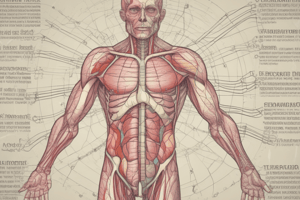Podcast
Questions and Answers
What is the primary function of endocrine glands?
What is the primary function of endocrine glands?
- To produce and secrete hormones into the bloodstream (correct)
- To regulate muscle contractions and movement
- To absorb nutrients from food
- To filter waste from the blood
Which gland is located at the base of the brain and regulates other endocrine glands?
Which gland is located at the base of the brain and regulates other endocrine glands?
- Thyroid Gland
- Hypothalamus
- Adrenal Glands
- Pituitary Gland (correct)
Which hormone regulates blood sugar levels?
Which hormone regulates blood sugar levels?
- Thyroid Hormone
- Testosterone
- Insulin (correct)
- Estrogen
Which gland regulates the female reproductive cycle?
Which gland regulates the female reproductive cycle?
Which gland is responsible for regulating calcium levels in the blood?
Which gland is responsible for regulating calcium levels in the blood?
Which tissue produces hormones that regulate energy balance and glucose metabolism?
Which tissue produces hormones that regulate energy balance and glucose metabolism?
Flashcards are hidden until you start studying
Study Notes
Overview of Endocrine Glands
- Endocrine glands are organs that produce and secrete hormones directly into the bloodstream.
- These glands regulate various bodily functions, such as growth, metabolism, and reproductive processes.
Types of Endocrine Glands
- Pituitary Gland: Located at the base of the brain, it regulates other endocrine glands and produces hormones that stimulate growth and development.
- Thyroid Gland: Located in the neck, it produces thyroid hormones that regulate metabolism, growth, and development.
- Adrenal Glands: Located on top of the kidneys, they produce hormones that regulate stress response, electrolyte balance, and blood pressure.
- Pancreas: Produces hormones that regulate blood sugar levels, such as insulin and glucagon.
- Ovaries (in females): Produce hormones that regulate the female reproductive cycle, such as estrogen and progesterone.
- Testes (in males): Produce hormones that regulate the male reproductive cycle, such as testosterone.
- Hypothalamus: Located in the brain, it regulates body temperature, hunger, and thirst.
- Parathyroid Glands: Located in the neck, they regulate calcium levels in the blood.
- Adipose Tissue: Produces hormones that regulate energy balance and glucose metabolism.
Functions of Endocrine Glands
- Regulation of growth and development
- Metabolism regulation
- Reproductive processes
- Stress response
- Electrolyte balance
- Blood pressure regulation
- Blood sugar regulation
- Calcium regulation
- Energy balance and glucose metabolism
Disorders Associated with Endocrine Glands
- Hypothyroidism: Underactive thyroid gland
- Hyperthyroidism: Overactive thyroid gland
- Diabetes: Insulin deficiency or resistance
- Adrenal insufficiency: Underactive adrenal glands
- Cushing's syndrome: Overactive adrenal glands
- Hypoparathyroidism: Underactive parathyroid glands
- Hyperparathyroidism: Overactive parathyroid glands
Studying That Suits You
Use AI to generate personalized quizzes and flashcards to suit your learning preferences.




